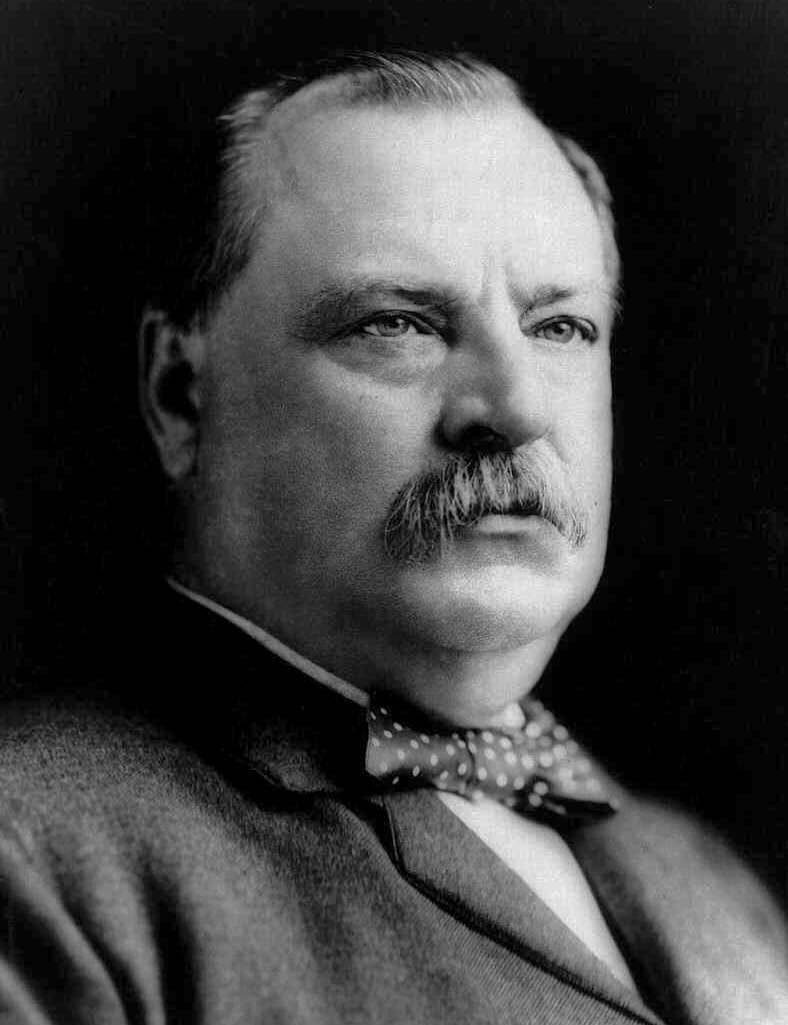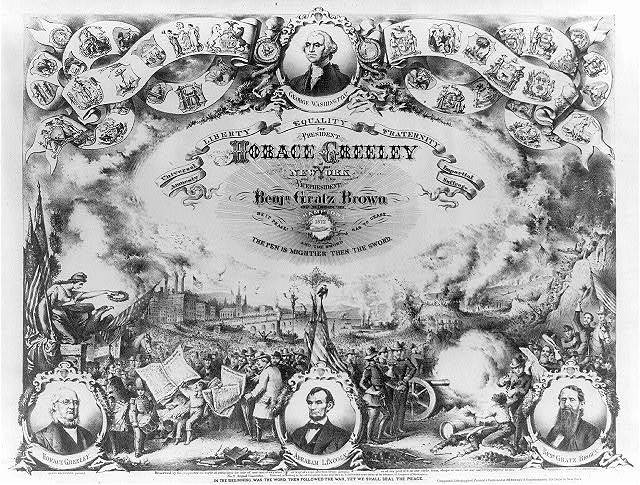|
Mugwump
The Mugwumps were Republican political activists in the United States who were intensely opposed to political corruption. They were never formally organized. Typically they switched parties from the Republican Party by supporting Democratic candidate Grover Cleveland in the presidential election of 1884. They switched because they rejected the long history of corruption associated with Republican candidate James G. Blaine. In a close election, the Mugwumps claimed they made the difference in New York state and swung the election to Cleveland. The jocular word "mugwump", noted as early as 1832, is from Algonquian ''mugquomp'', "important person, kingpin" (from ''mugumquomp'', "war leader"),On-line Etymological Dictionary [...More Info...] [...Related Items...] OR: [Wikipedia] [Google] [Baidu] |
Grover Cleveland
Stephen Grover Cleveland (March 18, 1837June 24, 1908) was an American lawyer and politician who served as the 22nd and 24th president of the United States from 1885 to 1889 and from 1893 to 1897. Cleveland is the only president in American history to serve two non-consecutive terms in office. He won the popular vote for three presidential elections—in 1884, 1888, and 1892—and was one of two Democrats (followed by Woodrow Wilson in 1912) to be elected president during the era of Republican presidential domination dating from 1861 to 1933. In 1881, Cleveland was elected mayor of Buffalo, and in 1882, he was elected governor of New York. He was the leader of the pro-business Bourbon Democrats who opposed high tariffs, free silver, inflation, imperialism, and subsidies to business, farmers, or veterans. His crusade for political reform and fiscal conservatism made him an icon for American conservatives of the era. Cleveland won praise for his honesty, self-relianc ... [...More Info...] [...Related Items...] OR: [Wikipedia] [Google] [Baidu] |
James Blaine
James Gillespie Blaine (January 31, 1830January 27, 1893) was an American statesman and Republican politician who represented Maine in the U.S. House of Representatives from 1863 to 1876, serving as Speaker of the U.S. House of Representatives from 1869 to 1875, and then in the United States Senate from 1876 to 1881. Blaine twice served as Secretary of State, first in 1881 under President James A. Garfield and Chester A. Arthur, and then from 1889–1892 under President Benjamin Harrison. He is one of only two U.S. Secretaries of State to hold the position under three separate presidents, the other being Daniel Webster. Blaine unsuccessfully sought the Republican nomination for President in 1876 and 1880 before being nominated in 1884. In the 1884 general election, he was narrowly defeated by Democrat Grover Cleveland. Blaine was one of the late 19th century's leading Republicans and a champion of the party's moderate reformist faction, later known as the " Half-Breeds" ... [...More Info...] [...Related Items...] OR: [Wikipedia] [Google] [Baidu] |
History Of The Republican Party (United States)
The Republican Party, also referred to as the GOP (meaning Grand Old Party), is one of the two major political parties in the United States. It is the second-oldest extant political party in the United States after its main political rival, the Democratic Party. In 1854, the Republican Party emerged to combat the expansion of slavery into American territories after the passing of the Kansas–Nebraska Act. The early Republican Party consisted of northern Protestants, factory workers, professionals, businessmen, prosperous farmers, and after the Civil War, former black slaves. The party had very little support from white Southerners at the time, who predominantly backed the Democratic Party in the Solid South, and from Catholics, who made up a major Democratic voting block. While both parties adopted pro-business policies in the 19th century, the early GOP was distinguished by its support for the national banking system, the gold standard, railroads, and high tariffs. Th ... [...More Info...] [...Related Items...] OR: [Wikipedia] [Google] [Baidu] |
1884 United States Presidential Election
The 1884 United States presidential election was the 25th quadrennial presidential election, held on Tuesday, November 4, 1884. It saw the first Democrat elected President of the United States since James Buchanan in 1856, and the first Democratic president to hold office since Andrew Johnson, who assumed the presidency after the assassination of Abraham Lincoln. Governor Grover Cleveland of New York defeated Republican James G. Blaine of Maine. The election was set apart by unpleasant mudslinging and shameful personal allegations that eclipsed substantive issues, for example, civil administration change. It was a historically significant election, as Cleveland was the only Democratic president between Andrew Johnson, who left office in 1869, and Woodrow Wilson, who began his first term in 1913, representing a disruption of the period of Republican domination of the presidency between Reconstruction and the Great Depression. Cleveland won the presidential nomination on th ... [...More Info...] [...Related Items...] OR: [Wikipedia] [Google] [Baidu] |
Liberal Republican Party (United States)
The Liberal Republican Party was an American political party that was organized in May 1872 to oppose the reelection of President Ulysses S. Grant and his Radical Republican supporters in the presidential election of 1872. The party emerged in Missouri under the leadership of Senator Carl Schurz and soon attracted other opponents of Grant; Liberal Republicans decried the scandals of the Grant administration and sought civil service reform. The party opposed Grant's Reconstruction policies, particularly the Enforcement Acts that destroyed the Ku Klux Klan. It lost in a landslide, and disappeared from the national stage after the 1872 election. The Republican Party had emerged as the dominant party in the aftermath of the Civil War, but many original Republicans became dissatisfied with the leadership of President Grant. Prominent liberal leaders like Schurz, Charles Sumner and Lyman Trumbull had been leaders in the fight against slavery and for the first stages of Reconstru ... [...More Info...] [...Related Items...] OR: [Wikipedia] [Google] [Baidu] |
Half-Breeds (politics)
The "Half-Breeds" were a political faction of the United States Republican Party in the late 19th century. The Half-Breeds were a comparably moderate group, and were the opponents of the Stalwarts, the other main faction of the Republican Party. The main issue that divided the Stalwarts and the Half-Breeds was political patronage. The Stalwarts were in favor of political machines and spoils system-style patronage, while the Half-Breeds, later led by Maine senator James G. Blaine, were in favor of civil service reform and a merit system. The epithet "Half-Breed" was invented in derision by the Stalwarts to denote those whom they perceived as being "only half Republican." The Blaine faction in the context of the Hayes era is commonly attributed as the congressional Half-Breeds, although this is erroneous. Blaine's political organization during this time formed an informal coalition with the Stalwarts in opposition towards aspects of the Hayes administration,Banks, Ronald F. (June ... [...More Info...] [...Related Items...] OR: [Wikipedia] [Google] [Baidu] |
Republican Party (United States)
The Republican Party, also referred to as the GOP ("Grand Old Party"), is one of the two major contemporary political parties in the United States. The GOP was founded in 1854 by anti-slavery activists who opposed the Kansas–Nebraska Act, which allowed for the potential expansion of chattel slavery into the western territories. Since Ronald Reagan's presidency in the 1980s, conservatism has been the dominant ideology of the GOP. It has been the main political rival of the Democratic Party since the mid-1850s. The Republican Party's intellectual predecessor is considered to be Northern members of the Whig Party, with Republican presidents Abraham Lincoln, Rutherford B. Hayes, Chester A. Arthur, and Benjamin Harrison all being Whigs before switching to the party, from which they were elected. The collapse of the Whigs, which had previously been one of the two major parties in the country, strengthened the party's electoral success. Upon its founding, it supported cl ... [...More Info...] [...Related Items...] OR: [Wikipedia] [Google] [Baidu] |
Theodore Roosevelt
Theodore Roosevelt Jr. ( ; October 27, 1858 – January 6, 1919), often referred to as Teddy or by his initials, T. R., was an American politician, statesman, soldier, conservationist, naturalist, historian, and writer who served as the 26th president of the United States from 1901 to 1909. He previously served as the 25th vice president under President William McKinley from March to September 1901 and as the 33rd governor of New York from 1899 to 1900. Assuming the presidency after McKinley's assassination, Roosevelt emerged as a leader of the Republican Party and became a driving force for anti-trust and Progressive policies. A sickly child with debilitating asthma, he overcame his health problems as he grew by embracing a strenuous lifestyle. Roosevelt integrated his exuberant personality and a vast range of interests and achievements into a "cowboy" persona defined by robust masculinity. He was home-schooled and began a lifelong naturalist avocation before attendi ... [...More Info...] [...Related Items...] OR: [Wikipedia] [Google] [Baidu] |
Edwin Godkin
Edwin Lawrence Godkin (2 October 183121 May 1902) was an Irish-born American journalist and newspaper editor. He founded '' The Nation'' and was the editor-in-chief of the '' New York Evening Post'' from 1883 to 1899.Eric Fettman, "Godkin, E.L." in Stephen L. Vaughn, (ed.) ''Encyclopedia of American Journalism''. London : Routledge, 2009. (p.200) Victor Navasky, "Afterword", in Katrina Vanden Heuvel, ''The Nation, 1865-1990 : Selections From The Independent Magazine of Politics and Culture.''New York : Thunder's Mouth Press, 1990. (pp. 513-17) Early life Godkin was born in Moyne (a hamlet in Knockananna), County Wicklow, Ireland. His father, James Godkin, was a Congregationalist minister and a journalist. He studied law at Queen's College, Belfast, where he was the first president of the Literary and Scientific Society. Journalist After leaving Belfast in 1851 and studying law in London, he was the Crimean War correspondent for the London '' Daily News'' in Turkey a ... [...More Info...] [...Related Items...] OR: [Wikipedia] [Google] [Baidu] |
Gilded Age
In United States history, the Gilded Age was an era extending roughly from 1877 to 1900, which was sandwiched between the Reconstruction era and the Progressive Era. It was a time of rapid economic growth, especially in the Northern and Western United States. As American wages grew much higher than those in Europe, especially for skilled workers, and industrialization demanded an ever-increasing unskilled labor force, the period saw an influx of millions of European immigrants. The rapid expansion of industrialization led to real wage growth of 60% between 1860 and 1890, and spread across the ever-increasing labor force. The average annual wage per industrial worker (including men, women, and children) rose from $380 in 1880, to $564 in 1890, a gain of 48%. Conversely, the Gilded Age was also an era of abject poverty and inequality, as millions of immigrants—many from impoverished regions—poured into the United States, and the high concentration of wealth became more ... [...More Info...] [...Related Items...] OR: [Wikipedia] [Google] [Baidu] |
Massachusett Language
The Massachusett language is an Algonquian language of the Algic language family, formerly spoken by several peoples of eastern coastal and southeastern Massachusetts. In its revived form, it is spoken in four communities of Wampanoag people. The language is also known as or (Wampanoag), and historically as , Indian or . The language is most notable for its community of literate Native Americans and for the number of translations of religious texts into the language. John Eliot's translation of the Christian Bible in 1663 using the Natick dialect, known as '' Mamusse Wunneetupanatamwe Up-Biblum God'', was the first printed in the Americas, the first Bible translated by a non-native speaker, and one of the earliest examples of a Bible translation into a previously unwritten language. Literate Native American ministers and teachers taught literacy to the elites and other members of their communities, influencing a widespread acceptance. This is attested in the numerous court ... [...More Info...] [...Related Items...] OR: [Wikipedia] [Google] [Baidu] |









